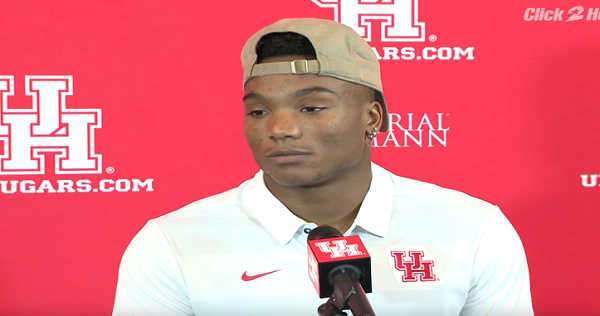
Houston QB D’Eriq King, who has been compared to Tim Tebow, explains his shocking choice to hang up his cleats and sit for the remainder of the season.
The promising and electric Houston Cougars have not followed the script authored by esoteric and analytical formulas of mathematical geeks crowning conference champions and mid-major powerhouses in the dog days of summer. Eerily, the anonymous pretentious algorithms depicting a statistical portrait of gridiron clashes rival the code bot police force patrolling the social networks with Gestapo precision. Yet, the Silicon Valley leadership says with a straight face and talking through the side of their mouths, that free speech is paramount goal in enhancing the user experience.
As lofty preseason expectations have whiffed against harsh reality through the first four games for a Houston, with three dismal losses and the sole ugly win against a middling FCS squad, the coaching staff has decided to raise the white flag of surrender and take advantage of a kink in a recent rule change that the powers that be at the NCAA headquarters completely overlooked… or maybe it was their intent all along. In 2018, a policy was instituted where a player could earn a redshirt season if they participated in no more than four games. The rule was implemented to allow freshmen and sophomore players to develop and play in live game action without losing eligibility. However this is where sensibility ends and things get curiously interesting.
Two Cougar players, including dual threat explosive quarterback and senior leader D’Eriq King and senior and second leading receiver Kevin Corbin, have decided to take full advantage of the redshirt rule and ride the pine for the rest of the season. Both will be available in 2020 for Houston or at another FBS program, prompting head coach Dana Holgorsen to craft this telling and strategically blatant statement, “I think the NCAA probably is upset with me right now because this wasn’t the intent of the rule.” With a New Year’s day bowl appearance out of the question, even the most gullible of armchair quarterbacks can clearly identify the egregious ulterior motive of the head coach and players to develop talent and shoot for the moon next season. Who can blame a competitor for exploiting a technicality in the rule book while striving to win?
NCAA officials are inconspicuously giddy of their brainchild, because the daring social experiment promotes parity, which leads to increased revenue in fueling the bureaucracy, and takes some of the heat off from critics demanding that football and men’s basketball players receive a stipend for the annual billions of dollars raised in keeping the brand highly relevant. It is no secret that television revenue and attendance from football and men’s basketball fund athletic departments and allow for a diverse array of competition and student athlete scholarship opportunities for both sexes. So why not indirectly award the deserving legendary gladiators for their contributions in making college sports a reality?
As the shock waves emanating from the bold choices of King and Corbin collide with the 130 campuses hosting big time college football, change is eminent in a sport that already faces relentless scrutiny pertaining to player safety and the controlling influence that network television enforces on dictating irregular and inconsistent scheduling paradigms which kill attendance. The glaring loophole in the redshirt rule at the very least adds a new layer of strategy and intrigue, as coaching staffs are given the luxury of staggering rosters to meet or exceed expectations, or in the case of Houston, to truly make next year, THE year, where dreams and reality conjoin in a riveting championship season.
The Saturdays of sipping of sipping a Bloody Mary at a crisp morning tailgate are forever trapped in the musty and ancient confines of the past, as the brave new world of the modern athletic industrial complex looms under the pretentious vapidness staining the broadcast empire. At least games still result in a winner and a loser and vigorous competition persists, until the radicals deem that defeat is a shameful trigger too hostile to accommodate hurt feelings.